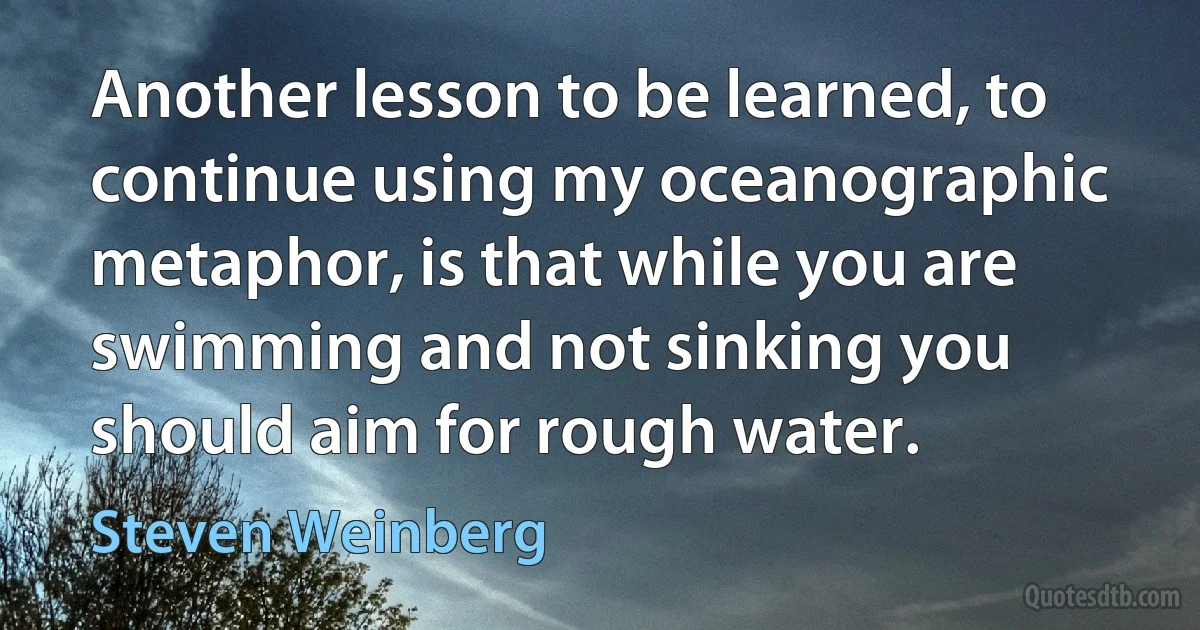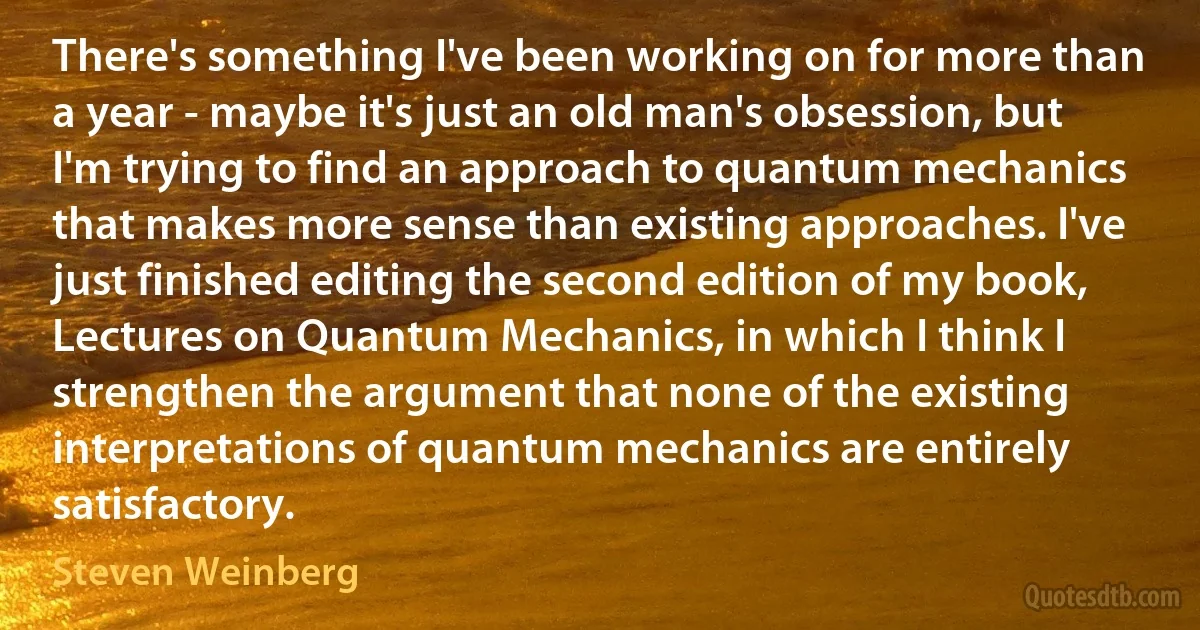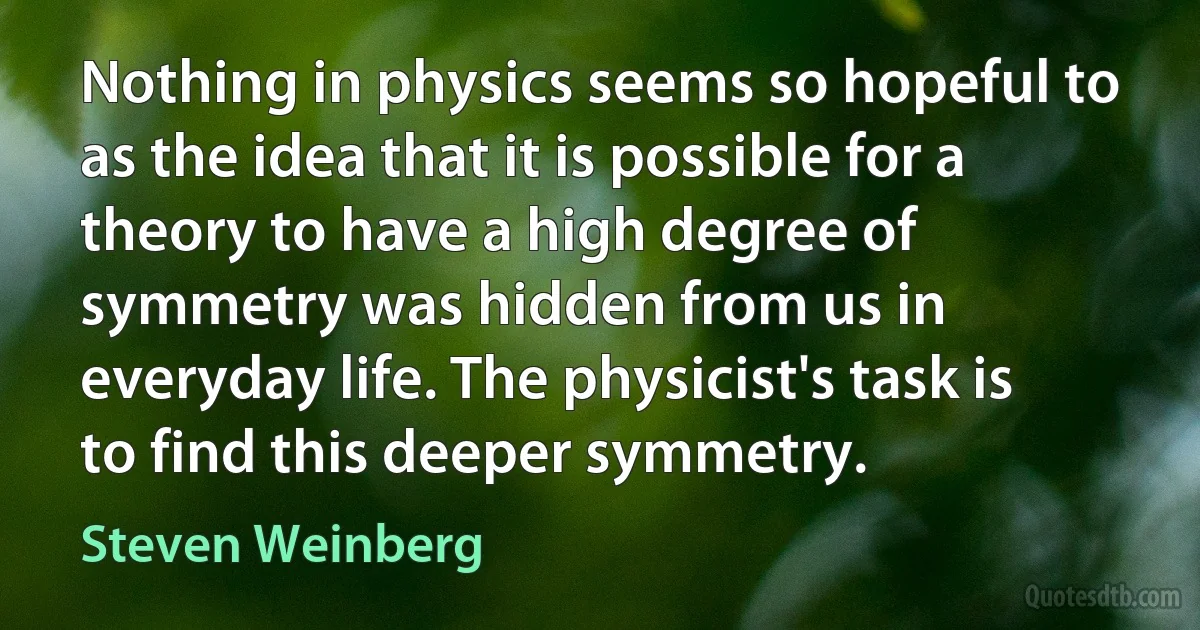Steven Weinberg quotes - page 2
Either by God you mean something definite or you don't mean something definite. If by God you mean a personality who is concerned about human beings, who did all this out of love for human beings, who watches us and who intervenes, then I would have to say in the first place how do you know, what makes you think so? And in the second place, is that really an explanation? If that's true, what explains that? Why is there such a God? It isn't the end of the chain of whys, it just is another step, and you have to take the step beyond that.

Steven Weinberg
Symmetry is not enough by itself. In electromagnetism, for example, if you write down all the symmetries we know, such as Lorentz invariance and gauge invariance, you don't get a unique theory that predicts the magnetic moment of the electron. The only way to do that is to add the principle of renormalisability – which dictates a high degree of simplicity in the theory and excludes these additional terms that would have changed the magnetic moment of the electron from the value Schwinger calculated in 1948.

Steven Weinberg
In this derivation Bohr had relied on the old idea of classical radiation theory, that the frequencies of spectral lines should agree with the frequency of the electron's orbital motion, but he had assumed this only for the largest orbits, with large n. The light frequencies he calculated for transitions between lower states, such as n=2 → n=1, did not at all agree with the orbital frequency of the initial or final state. So Bohr's work represented another large step away from classical physics.

Steven Weinberg
Planck's quantization assumption applied to the matter that emits and absorbs radiation, not to radiation itself. As George Gamow later remarked, Planck thought that radiation was like butter; butter itself comes in any quantity, but it can be bought and sold only in multiples of one quarter pound. It was Albert Einstein (1879–1955) who in 1905 proposed that the energy of radiation of frequency ν was itself an integer multiple of hν.

Steven Weinberg
The development of quantum mechanics in the 1920s was the greatest advance in physical science since the work of Isaac Newton. It was not easy; the ideas of quantum mechanics present a profound departure from ordinary human intuition. Quantum mechanics has won acceptance through its success. It is essential to modern atomic, molecular, nuclear, and elementary particle physics, and to a great deal of chemistry and condensed matter physics as well.

Steven Weinberg
The years since the mid-1970s have been the most frustrating in the history of particle physics. We are paying the price of our own success: theory has advanced so far that further progress will require the study of processes at energies far beyond the reach of existing facilities. In order to break our of this impasse, physicists began in 1982 to develop plans for a scientific project of unprecedented size and cost, known as the Superconducting Super Collider.

Steven Weinberg
My own conclusion is that today there is no interpretation of quantum mechanics that does not have serious flaws. This view is not universally shared. Indeed, many physicists are satisfied with their own interpretation of quantum mechanics. But different physicists are satisfied with different interpretations. In my view, we ought to take seriously the possibility of finding some more satisfactory other theory, to which quantum mechanics is only a good approximation.

Steven Weinberg
To start, we will consider a single particle moving in three space dimensions under the influence of a general central potential. Later we will specialize to the case of a Coulomb potential, and work out the spectrum of hydrogen. One other classic problem, the harmonic oscillator, will be treated at the end of this chapter.

Steven Weinberg
The best military historians in fact do recognize the difficulty in stating rules of generalship. They do not speak of a science of war, but rather of a pattern of military behavior that cannot be taught or stated precisely but that somehow or other sometimes helps in winning battles. This is called the art of war. In the same spirit I think that one should not hope for a science of science, the formulation of any definite rules about how scientists do or ought to behave, but only aim at a description of the sort of behavior that historically has led to scientific progress-an art of science.

Steven Weinberg
Our mistake is not that we take our theories too seriously, but that we do not take them seriously enough. It is always hard to realize that these numbers and equations we play with at our desks have something to do with the real world. ...The most important thing accomplished by the three-degree radiation background in 1965 was to force us to take seriously the idea that there was an early universe.

Steven Weinberg
Considering the pervasive importance of quantum mechanics in modern physics, it is odd how rarely one hears of efforts to test quantum mechanics experimentally with high precision....The trouble is that it is very difficult to find any logically consistent generalization of quantum mechanics. One obvious target for generalization is the linearity of quantum mechanics, but if we arbitrarily add nonlinear terms to the Schrodinger equation, how do we know that the theory we obtain will have a sensible physical interpretation? At least in part, it is the dearth of generalized versions of quantum mechanics that has made it so hard to plan experimental tests of quantum mechanics.

Steven Weinberg
As you will never be sure which are the right problems to work on, most of the time that you spend in the laboratory or at your desk will be wasted. If you want to be creative, then you will have to get used to spending most of your time not being creative, to being becalmed on the ocean of scientific knowledge.

Steven Weinberg
In fact, there is something puzzling about the Higgs mass we now do observe. It is generally known as the "hierarchy problem.” Since it is the Higgs mass that sets the scale for the masses of all other known elementary particles, one might guess that it should be similar to another mass that plays a fundamental role in physics, the so-called Planck mass, which is the fundamental unit of mass in the theory of gravitation. (It is the mass of hypothetical particles whose gravitational attraction for one another would be as strong as the electric force between two electrons separated by the same distance.) But the Planck mass is about a hundred thousand trillion times larger than the Higgs mass. So, although the Higgs particle is so heavy that a giant particle collider was needed to create it, we still have to ask, why is the Higgs mass so small?

Steven Weinberg
One of the things that excited me so much about quantum chromodynamics after the work of Gross and Wilczek and Politzer was that it seemed to provide a rational explanation for what had always been mysterious to me - the fact that there were symmetries, like parity conservation, charge conjugation invariance, and strangeness conservation, that were very good symmetries of the strong and electromagnetic interactions - as far as we knew exact - and yet were not respected by the weak interactions. Why should nature have ... symmetries that are symmetries of part of nature but not other parts of nature?

Steven Weinberg



